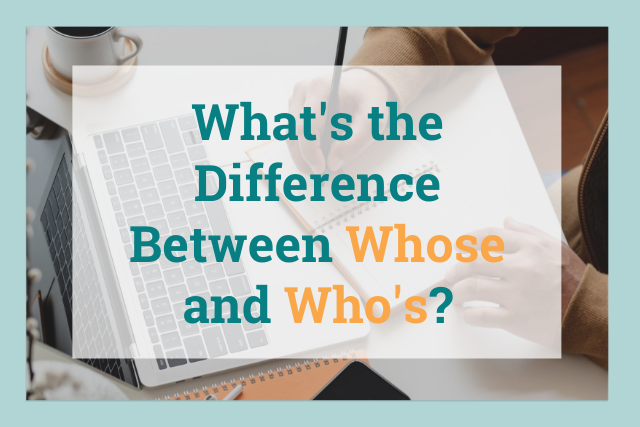
Whose and who’s are tricky homophones. These words sound alike, but they don't have the same meaning at all.
Keep reading to learn all about the difference between whose and who’s.
What Is the Difference Between Whose and Who’s?
Whose vs. who’s is one of the easiest mix-ups in English. Even though both words contain "who," they have different meanings and are different parts of speech. This difference means that the two words can't be used interchangeably.
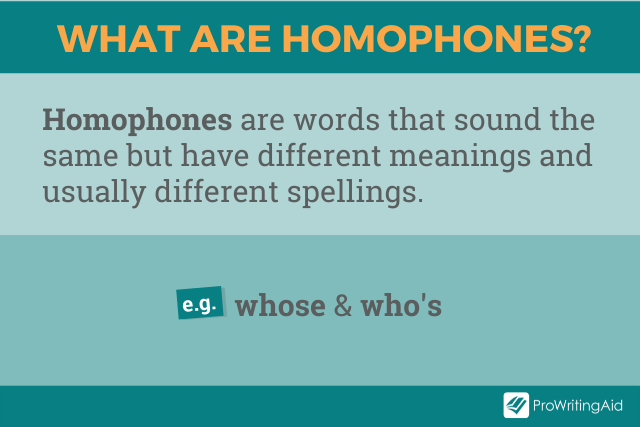
In short, the difference can be summed up like this:
- Whose is a possessive pronoun indicating who owns something
- Who’s is a contraction that is short for "who is" or "who has."
To better understand the difference between whose vs. who’s, we need to dive deep into the definitions of each word, as well as their grammar functions. Let’s get started!
What Does Whose Mean?
Whose is used to indicate that something belongs to or is associated with a person or thing that has previously been mentioned.
- The dog, whose paw prints were all over the carpet, looked guilty.
Here, whose means that the dog is associated with the paw prints—he left them on the carpet.
Because whose doesn’t give us enough information on its own to work out who someone is talking about, it is used after you have already mentioned a specific thing or person, or in a question when you don’t know who you are talking about.
This gets easier with examples:
- The man, whose hair was bright orange, stood out from the crowd.
In this sentence, whose shows that the hair being talked about belongs to the man. Without referencing the man first, we wouldn’t know what subject whose was referring to.
But if we want to know who something belongs to, we can use whose in a question, like this:
- Whose paw prints are these?
What Kind of Word Is Whose?
Okay, now we’re going to get a bit more grammatical.
Whose is technically always a possessive pronoun. That means that it shows possession or ownership. For example, in the question "Whose phone is this?" you’re asking who owns the phone.
However, whose is also often used as a possessive adjective. What does this mean? It takes a few steps to explain.
A pronoun (like he, she, it) is a word that replaces a noun (a thing, person, or idea), especially a proper noun (a name).
Whose is a possessive pronoun, which means it shows possession or ownership. It replaces the person or thing to whom something belongs in a sentence.
Look at the following example.
- The girl whose eyes shine like diamonds
In this example, whose is showing that the eyes belong to the girl. But it’s also doing something else. At the same time, it is telling us which girl we are talking about by describing her.
Because of this dual function, this possessive pronoun is also functioning like a possessive adjective. It’s a stand-in for the girl, like a pronoun, but it is describing ownership of the eyes, like an adjective.
When whose comes before a noun in this way, it functions like a possessive adjective. When there is no following noun, it functions solely as a possessive pronoun.
An example of this would be asking:
- Whose is it?
Whose is replacing a specific noun, and we would need more context to know what object is being referenced.
Whew. That’s a lot of definitions.
In short, whose is a possessive pronoun that indicates ownership or belonging.
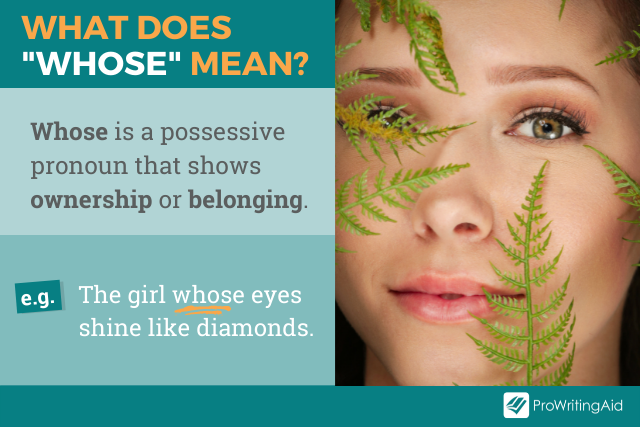
How Do You Use Whose in a Sentence?
Let’s look at some examples of how to use whose in your writing.
- Do you know whose birthday is is?
- I had no idea whose dog it was.
- Don't get caught up in whose fault it was.
- "Whose are these?" Mom asked, holding up a pair of socks.
- Whose cell phone has signal here?
- Let me know whose proposal you choose.
- Whose idea was the best?
- Can you tell me whose project was better?
Notice that each of these sentences references a noun or pronoun in the possessive form. It’s talking about possession, which is why we are using whose.
What Does Who’s Mean?
Who’s, on the other hand, is a contraction. Who’s can mean both "who is" or "who has."
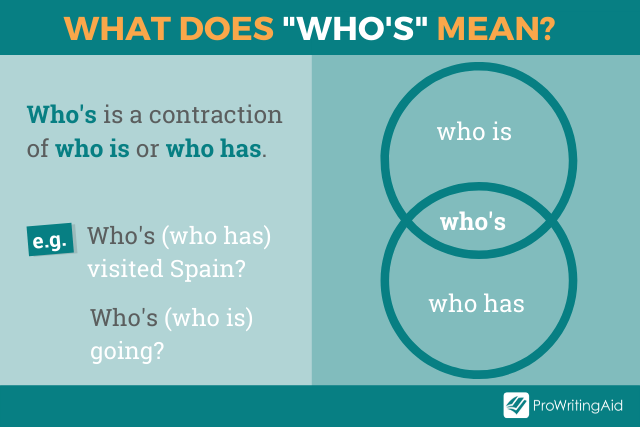
A contraction is a way to combine and shorten words, usually two words or more. We speak in contractions often, so it’s important to use them in informal or conversational writing.
Who’s is a combination of "who" plus the verb "is" or "has."
Who is also pronoun but it isn’t the possessive form like whose. Instead, it is a questioning or interrogative pronoun (which means it is used to ask a question).
The apostrophe in who’s replaces part of the verbs is or has in the phrases who is and who has.
To determine whether the contraction means who is or who has, the context of the rest of the sentence or conversation is crucial.
When who’s means who is, it’s dealing with the present tense. The word "who" is followed by either a verb, adverb, or adjective, like in the examples below.
- Who’s going? / Who is going?
- Who’s here? / Who is here?
- Who’s knowledgeable about computers? / Who is knowledgeable about computers?
When who’s means who has, it can have two functions: the third-person singular form of the present perfect tense or the third-person singular form of the present perfect progressive tense.
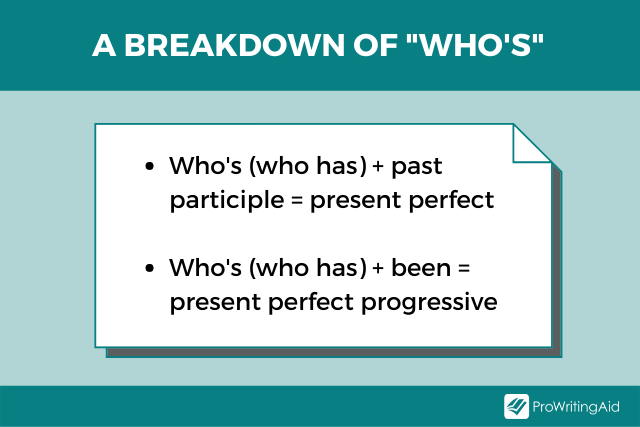
Present perfect is a tense that references something that occurred in the past at an unspecified time or began in the past. When this is the function of who’s, it precedes a verb.
- Who’s written a novel before? = Who has written a novel before?
- Who’s visited Spain? = Who has visited Spain?
Who’s as present perfect can go one step further and be part of present perfect progressive. Don’t worry too much about these terms—present perfect progressive just means something that started in the past and continues in the present. In this case, who’s will precede "been."
For example, "Who’s been a writer for more than five years?" We know this sentence contains the contraction for "who has" because it’s asking about someone who started being a writer in the past and is now still a writer in the present.
How Do I Use Who’s in a Sentence?
Now let’s look at some examples of how to use who’s in a sentence. Since who’s can be a contraction for two words—"is" and "has"—we need examples of both.
We'll divide these up between "who is" and "who has" to really help you understand how who's is used.
Here are some examples where who’s is a contraction of "who is."
- Who’s a good dog?
- Have you heard who’s speaking at the convention?
- Sally told me who’s going to the beach this summer.
- Who’s hungry for pizza?
- Do you know who’s behind all the murders?
- Who’s your professor for political science?
- We need to know who’s attending the wedding by June 4th.
- Everyone who’s anyone is at this party tonight.
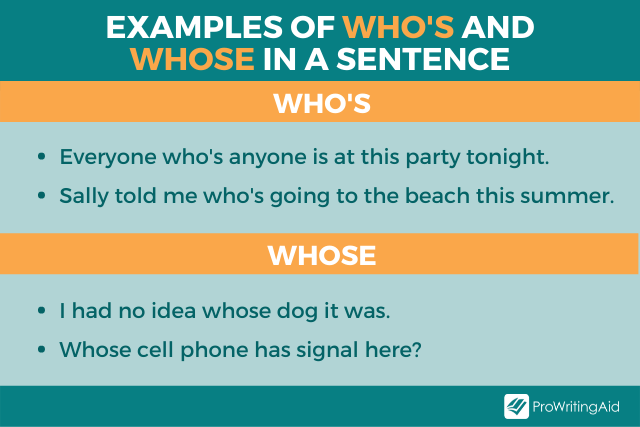
If you read all of the examples above and replace who’s with "who is," they’ll still make sense. But what about the other use of who’s?
If a sentence uses the present perfect or present perfect progressive tense, who’s is a contraction for "who has." Here are a few examples.
- Who’s attended Comic-Con before?
- She wants to know who’s been at the company the longest.
- Who’s got a calculator?
- Ask who’s seen all the Marvel movies.
- Who’s been to this restaurant before?
- Who’s received their tax return?
- I wonder who’s gotten their college acceptance letters.
- Who’s been your biggest influence in your career?
While replacing who’s with "who is" doesn’t make sense, "who has" does. That’s how we know to use_ who’s_ in each of these sentences.
How Can I Remember the Difference Between Whose vs Who’s?
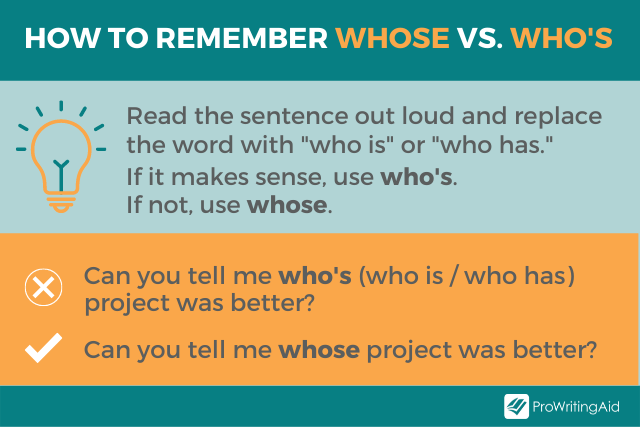
Those were some pretty technical definitions of whose and who’s. When you’re in the flow of writing, you might not think about the intricacies of grammar, like parts of speech and verb tenses.
So what’s an easier way to remember the difference between whose vs. who’s_ in the moment?
If you’re looking at your writing and can’t decide whether to use whose or who’s, read the sentence out loud and replace the word in question with "who is" and "who has."
If it makes sense with one of those, you’ll use who’s. If it doesn’t make sense, use whose.
Typos are embarrassing. If you’re worried about using the wrong word, use ProWritingAid to highlight confused words as you write.
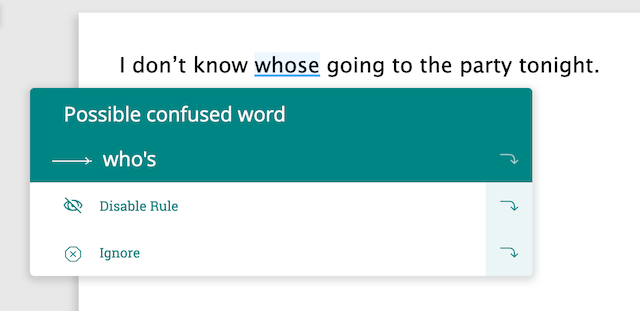
Download the free browser extension to catch this and 1000s of other errors wherever you write.
Whose vs. Who’s Test
Are you ready to test your knowledge in the great battle between whose vs. who’s? Take a look at these example sentences and decide whether to use who’s or whose.
- Whose/Who’s going to be at the party?
- Whose/Who’s fingerprints are those?
- We don’t know whose/who’s involved in the scandal.
- Ask them whose/who’s been married the longest.
- Everyone loves a person whose/who’s smile lights up a room.
ANSWERS:
- 1,3, and 4: "who’s"
- 2 and 5: "whose"
How did you do?
That’s everything you need to know about these tricky homophones. We hope you have a greater understanding of the difference between whose vs. who’s.

